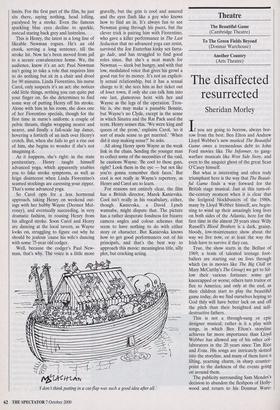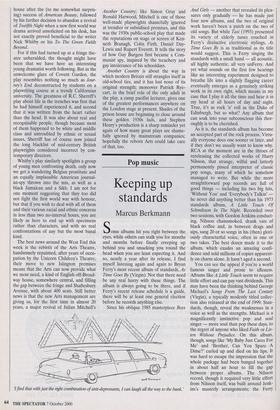Theatre
The Beautiful Game (Cambridge Theatre) To The Green Fields Beyond (Donmar Warehouse) Another Country (Arts Theatre)
The disaffected resurrected
Sheridan Morley
If you are going to borrow, always bor- row from the best: Ben Elton and Andrew Lloyd Webber's new musical The Beautiful Game owes a tremendous debt to John Ford movies like The Informer, to gang- warfare musicals like West Side Story, and even to the unquiet ghost of the great Sean O'Casey himself.
But what is interesting and often truly triumphant here is the way that The Beauti- ful Game finds a way forward for the British stage musical. Just at this turn-of- the-century moment when it is clear that the feelgood blockbusters of the 1980s, many by Lloyd Webber himself, are begin- ning to wind up their amazingly long lives on both sides of the Atlantic, here for the first time in the almost 20 years since Willy Russell's Blood Brothers is a dark, grainy, bloody, low-maintenance show about the way we live now, or at least the way the Irish have to survive if they can.
True, the show starts in the Belfast of 1969; a team of talented teenage foot- ballers are starting out on lives through which (as in movies like The Big Chill or Mary McCarthy's The Group) we get to fol- low their various fortunes: some get kneecapped or worse; others turn traitor or flee to America; and only at the end, as their children start to play the beautiful game today, do we find ourselves hoping to God they will have better luck on and off the pitch than their benighted and self- destructive fathers.
This is not a through-sung or epic designer musical; rather is it a play with songs, in which Ben Elton's storyline achieves far more importance than Lloyd Webber has allowed any of his other col- laborators in the 20 years since Tim Rice and Evita. His songs are intricately slotted into the storyline, and many of them have a lilting, yearning charm, in sharp counter- point to the darkness of the events going on around them.
The publicity surrounding Sam Mendes's decision to abandon the fleshpots of Holly- wood and return to his Donmar Ware- house after the (to me somewhat surpris- ing) success of American Beauty, followed by his further decision to abandon a revival of Twelfth Night when a new first world war drama arrived unsolicited on his desk, has not exactly proved beneficial to the writer Nick Whitby or his To The Green Fields Beyond.
For if this had turned up at a fringe the- atre unheralded, the thought might have been that we have here an interesting young dramatist worth following. But in the unwelcome glare of Covent Garden, the play resembles nothing so much as Jour- ney's End deconstructed by students on a playwriting course at a trendy Californian university. The greatness of R.C. Sherriff s play about life in the trenches was first that he had himself experienced it, and second that it was written from the heart rather than the head. It was also about real and recognisable people, though because most of them happened to be white and middle class and untroubled by ethnic or sexual issues, Sherriff has of course now joined the long blacklist of mid-century British playwrights considered incorrect by con- temporary directors.
Whitby's play similarly spotlights a group of young men confronting death, only now we get a wandering Belgian prostitute and an equally implausible American journal- ist-spy thrown into the mix, as well as a black Jamaican and a Sikh. I am not for one moment suggesting that they too did not fight the first world war with honour, but that if you wish to deal with all of them and their various racial and ethnic concerns in less than two no-interval hours, you are likely as here to end up with specimens rather than characters, and with no real confrontations of any but the most banal kind.
The best news around the West End this week is the rebirth of the Arts Theatre, handsomely repainted, after years of occu- pation by the Unicorn Children's Theatre; their move to new Islington premises means that the Arts can now provide what we most need, a kind of English off-Broad- way house, somewhere central, and filling the gap between the fringe and Shaftesbury Avenue, with about 400 seats. Still better news is that the new Arts management are giving us, for the first time in almost 20 years, a major revival of Julian Mitchell's Another Country; like Simon Gray and Ronald Harwood, Mitchell is one of those well-made playwrights shamefully ignored at trendier or subsidised premises, and this was the 1930s public-school play that made the reputations on stage or screen of Ken- neth Branagh, Colin Firth, Daniel Day- Lewis and Rupert Everett. It tells the story of how Guy Burgess first became a Com- munist spy, inspired by the treachery and gay intolerance of his schooldays.
Another Country is about the way in which modern Britain still strangles itself in old-school ties, and it has lost none of its original strength; moreover Patrick Rye- cart, in the brief role of the only adult in the play, a camp pacifist lecturer, gives one of the greatest performances anywhere on the London stage at present. Shades of the prison house are beginning to close around these golden 1930s lads, and Stephen Henry's production is a sharp reminder yet again of how many great plays are shame- fully ignored by mainstream companies; hopefully the reborn Arts could take care of that, too.



















































































 Previous page
Previous page